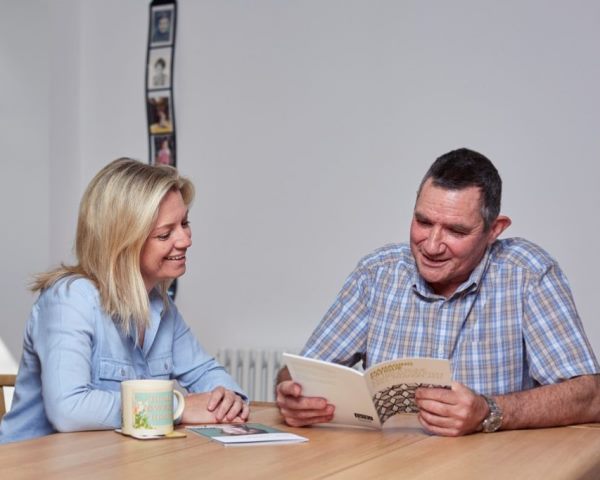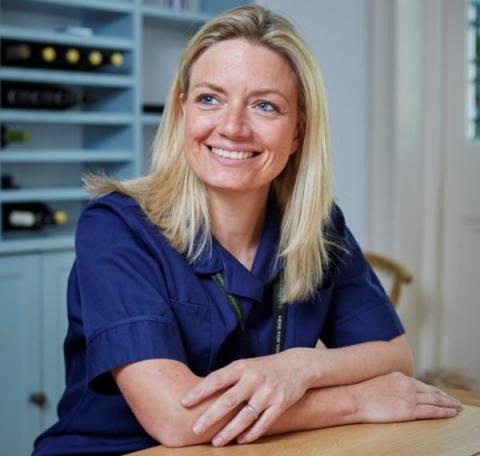Concerns about infection control is something that many stem cell transplant recipients and those close to them can relate to.
We asked our Anthony Nolan Lead Nurse, Hayley Leonard, to share some of the guidance she gives patients about managing infections.
The risk of infections is a constant concern for patients before and after a transplant. So you are not alone! The period of time it takes for the immune system to recover after a transplant is far longer than when you receive chemotherapy alone, it takes approximately six months to a year. So awareness of the signs and symptoms of an infection and knowing what to do is essential in this period.
Be informed
Every transplant hospital will have slightly different criteria for when you should contact them if you have a temperature so you should discuss what that criteria is with your clinical nurse specialist or key worker before you are discharged. Another way to be prepared is to make sure you are given a contact number that can be used 24hours a day, 7 days a week, so you have someone to call when at home.
Home from the hospital
Once you are discharged, ensure you have a thermometer at home. You do not need to take your temperature constantly but maybe once a day, at a similar time, so you get to know what is normal for you.
Generally a temperature is considered anything above 38 Degrees Celsius. So if your temperature goes above this, even if you feel well, you should call the your transplant team. If your temperature drops very low this can also be a sign of infection, so you must do the same. Never ignore a temperature; especially if you are on immunosuppression or steroids. If you do have an infection and it goes untreated you can become very unwell very quickly. It is much safer to call and speak to someone than for it to become an emergency.
Trust your instincts. If you do not feel well or right in any way, if you are short of breath, develop a cough or cold and flu symptoms even without a temperature, it’s always advisable to call your transplant team to discuss. It is normal to have some nausea or diarrhoea when recovering from a transplant, but if either of these increases in volume or frequency again contact your medical team.
Common sense and good hygiene
When trying to prevent infections it is best to avoid anyone who has an infection or feels under the weather. This does not mean avoiding people all together! As long as they are well then it’s fine to see family and friends after the transplant.
Everyone is different so do this at your own pace, but you do not have to isolate yourself away, especially if you think it will help your emotional wellbeing to see people. It is however not advisable to be in large crowds or use public transport, so that means you will need to get into the habit of making a plan before you go out.

'When trying to prevent infections it is best to avoid anyone that has an infection or feels under the weather. This does not mean avoiding people all together! As long as they are well then it’s fine to see family and friends after the transplant.'
Children and pets
If you have children that are school age, it’s advisable to inform the school of your recovery and to ask them to let you know if there is an outbreak of any infections in the school. You can then discuss any precautions you might need to take with your clinical nurse specialist if this happens.
Interacting with your children is an essential part of your recovery so it is not necessary to avoid them. However, you should encourage good hand hygiene and ask them to tell you straight away if they are not feeling well. If you have pets, again this is fine as they too often have a really positive effect on recovery...as long as you do not empty litter trays, or let them lick your face or hands! It is advisable to wash your hands after you have spent time with them.
Diet
You will be given advice on a diet after a transplant and again this might vary from each transplant hospital. The best advice I can give is to make sure everything you eat is freshly made and the ingredients have been washed thoroughly. If eating frozen meals, always ensure that they are piping hot. Avoid reheating food if you can but if you do, again, make sure it’s piping hot.
High-risk food like shellfish or blue cheeses should be avoided and also refrain from having takeaways and eating out for the first few months, especially when you are on immunosuppressants.
Expectations
It’s important to remember that getting an infection after you have gone home is expected after the transplant.
Early reporting of symptoms is essential and might even help you avoid an admission; your Clinical Nurse Specialist will never mind you calling. It’s always better to check.
If, however, you are re-admitted with an infection, as disappointing and frustrating as it is, remember: this is a normal part of the recovery. Over time the risks of infections will become less and you will be getting stronger all the time.
For more information about infections, download our essential guide
